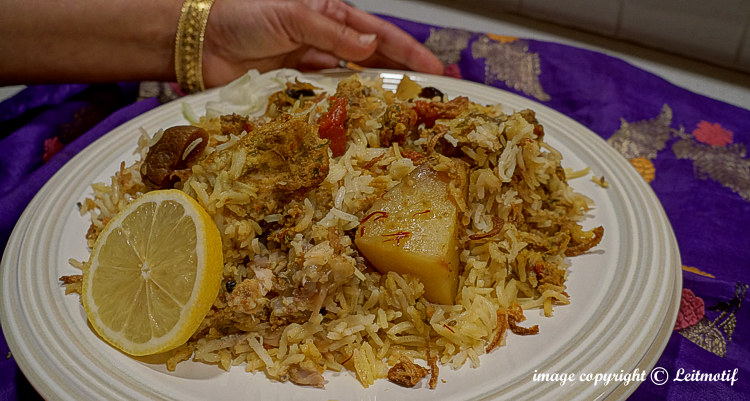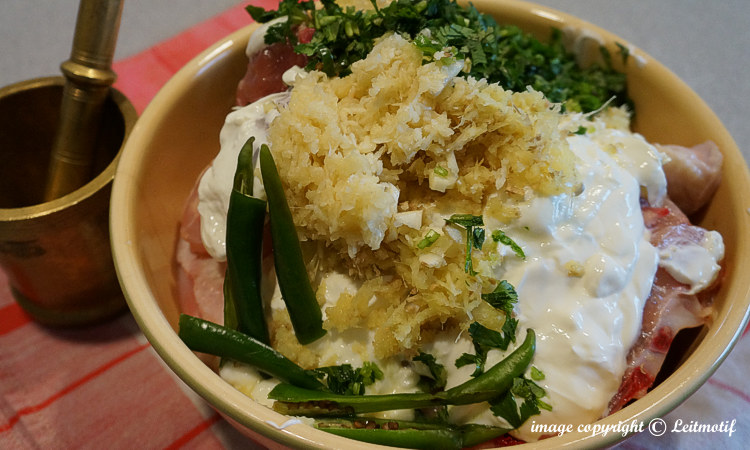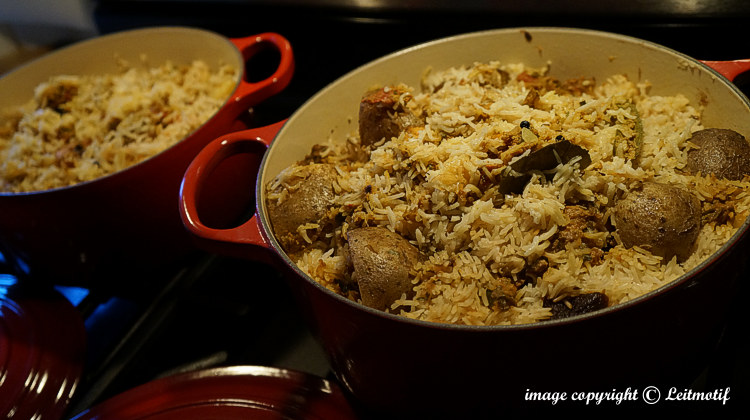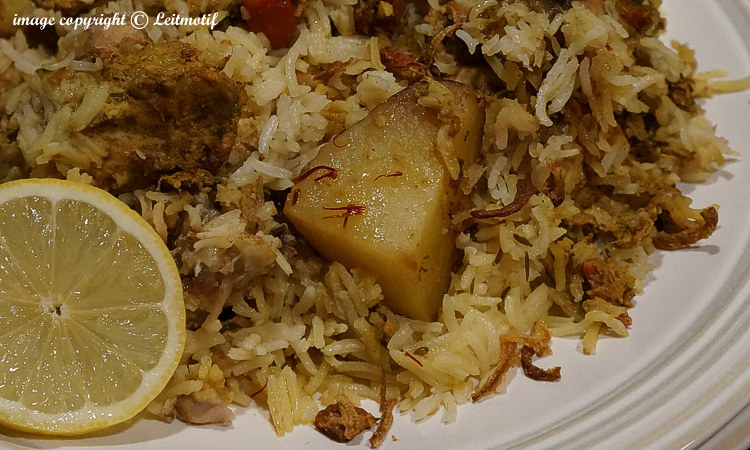Cooking biryani demands that I be in a bucolic if not sanguine state of mind – a well-tempered cook. The process can be quite laborious, but because the final result is so gob-smacking great, any Indian cook worth his or her salt will create this dish on special occasions – celebrations, big Sunday lunches and the like. It’s an absolute must for weddings of course, at which a professional cook or khansama, usually male, is employed. This khansama will bring along his helpers, utensils, charcoal stoves, ingredients and probably live chickens to the venue early in the morning. To watch the maestro go through the the various stages of preparation is fascinating if not mystifying, and epitomizes my approach to cooking. Ingredients are arbitrarily measured, spices vanish into the fire with a sleight of hand, and occasionally cooking time is measured by how long it takes the cook to smoke a certain number of cigarettes or bidis! Trust me, this almost haphazard style eventually served up a ‘haute cuisine’ creation that was worthy of Moghul royalty and we all felt like one when we ate it. My own mother would cook biryani in a a huge brass vessel (50 people for a birthday dinner was the norm) using the traditional Dum Pakht technique or the slow cooking technique over a low charcoal fire. The fragrant rice and spiced meat (usually mutton/goat) were layered in the vessel or hundi and the lid glued to the vessel with a thick paste of flour and water so as not to let the steam escape.
8 cups water
2.5 lbs chopped chicken (or mutton) with bones
3 large potatoes, quartered
10 dried apricots or plums
1/2 cup vegetable oil (to fry onions, potatoes)
1/4 cup ghee (for rice)
Spices for the Rice
3 x 2″ sticks Indian cinnamon
8 large black cardamon or ‘badi elaichi’
1 tsp sweet cumin or ‘shahjeera’
1 tbsp cumin
12 peppercorn
4 bayleaf
Spices for the Chicken Marinade
1 cup yoghurt
3 tbsp. ginger paste
4 tbsp. garlic paste
6 long green chillies slit
Juice of 2 limes
1 tsp. turmeric powder
3 tbsp. roasted coriander powder
1 tbsp red chili powder
1/2 cup finely chopped coriander leaves
3 large onions
2 large tomatoes, chopped
orange food coloring
salt to taste
Accompaniments
Thinly sliced onions marinated in lime and salt
Raita of chopped tomatoes, cucumber, onions, green chillies
Yoghurt
Step 1: Preparing the chicken and marinade
- Wash and pat dry the chicken with a towel. Carve the chicken and cut into 3″ pieces
- Heat vegetable oil in a pan, and fry onions until browned lightly. Drain with a slotted spoon and grind to a fine paste
- In a large bowl, mix all the ingredients for the chicken marinade. Test the salt
- Add chopped chicken pieces, and refrigerate bowl for 4 hours
Step 2: Potatoes
- Fry potatoes in the same oil that was used for the onions until they turn a light golden – at this point they will remain half cooked, which is what is needed. (you can leave the skin on as I do)
- Sprinkle a little salt over them
- Remove the potatoes from the pan with a slotted spoon
Step 3: Rice
- In a pan, heat ghee and when hot, add the spices for the rice.
- After 45 seconds or so, when the spices have released their aroma (be careful not to burn), add the washed & drained rice and stir fry gently for 2 minutes until the grains get translucent
- Add salt, water, dried plums and and bring to boil and switch off fire
Step 4: Assembly and oven
- In a heavy bottom container (Dutch ovens are perfect), start layering the rice and chicken
- First add a layer of chicken with the marinade at the bottom
- On top of the chicken, add the fried potatoes
- Over this, gently spoon the parboiled rice
- Add the water in which the rice was boiled, plums and food coloring
- Again, do a salt test
- In a bowl, mix saffron threads with hot milk and ghee and pour over the assembled biryani
- Seal with a heavy lid, and slow cook in the oven at 300F for 1 1/4 hours
- Keep biryani covered until ready to serve
- Serve with your choice of accompaniments: sliced onions, lime wedges, fresh mint leaves, pickle and/or yogurt






Hi, thank you for this lovely recipe, North-Indian Chicken Biryani. I am about to attempt it but I am a little confused with the amount of water to add when doing the final assembly. In your recipe you say “Add the water in which the rice was boiled, plums and food coloring” Please may I ask, is this the remainder from the 8 cups of water stated in the recipe? Also if I want to reduce to 2 cups of rice, how much water would I need? 4 cups? Thanks again and can’t wait to try this out!